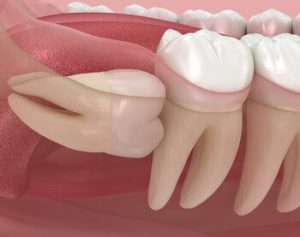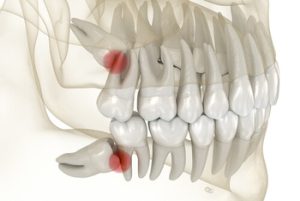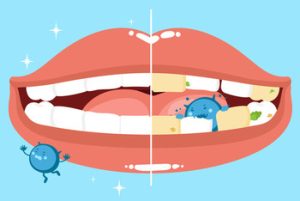Wisdom teeth, also known as third molars, are the last teeth to appear in the human mouth. They usually make their entrance in your late teens or early twenties. While some people barely notice their arrival, others are not so lucky. Problems linked to wisdom teeth can lead to a surprising range of uncomfortable symptoms. But can wisdom teeth cause ear and throat pain? The short answer is yes, they can. Let’s explore how and why this happens and what you can do about it.
How Do Wisdom Teeth Affect Surrounding Areas Like Your Ear and Throat?
 When your wisdom teeth come through properly, they usually do not cause much trouble. But if you have impacted wisdom teeth, meaning the teeth do not have enough space to emerge or grow at the correct angle, this can trigger a chain reaction of problems. The gum tissue surrounding an impacted wisdom tooth can become swollen or infected. This swelling and infection often spread to nearby structures, including the throat and ear.
When your wisdom teeth come through properly, they usually do not cause much trouble. But if you have impacted wisdom teeth, meaning the teeth do not have enough space to emerge or grow at the correct angle, this can trigger a chain reaction of problems. The gum tissue surrounding an impacted wisdom tooth can become swollen or infected. This swelling and infection often spread to nearby structures, including the throat and ear.
This connection happens because the nerves in your jaw, teeth, ears, and throat are closely linked. Pain from an impacted tooth can travel along these nerves, leading to ear pain, sore throats, and jaw pain. This is known as referred pain, and it can make it tricky to identify the exact cause without professional help.
The Hidden Link Between Impacted Wisdom Teeth and Sore Throats
You might be surprised that your wisdom teeth can cause a sore throat. When the gum tissue surrounding a wisdom tooth becomes infected, the infection site becomes inflamed. This inflammation can extend towards your throat, making swallowing painful and uncomfortable. Food particles that get trapped near the tooth site or under the gum flap can feed bacteria, leading to an infected wisdom tooth.
Infected wisdom teeth do not just cause sore throats. They can bring along other uncomfortable symptoms like bad breath, swollen gums, tenderness, difficulty opening your mouth properly, and a bad taste. If you notice these signs along with a sore throat, your wisdom teeth might be the culprit.
Could Ear Pain Really Be Caused by Wisdom Teeth?
Recurring ear pain without any ear infection could actually be linked to your wisdom teeth. Impacted or infected wisdom teeth, especially lower wisdom teeth, often cause pressure and pain that radiates toward the ears. This happens because the nerves that serve the jaw and the ear are closely connected.
When people have impacted wisdom teeth, they sometimes report ear pain that comes and goes. This can be confusing, as it may mimic an ear infection. However, if your ear pain occurs alongside tooth pain, jaw discomfort, or swelling in your mouth, your wisdom teeth might be the underlying cause.
The Role of Tooth Decay and Infections in Ear and Throat Pain
Untreated tooth decay in wisdom teeth eventually leads to larger oral health issues. Because wisdom teeth are hard to clean properly, they are more prone to developing cavities. Untreated tooth decay can spread, creating an abscessed tooth or tooth infection. These conditions can cause significant pain that radiates to the ear and throat.
An infected wisdom tooth may also contribute to swollen gums, tenderness, difficulty chewing, and other symptoms like fever or swollen lymph nodes. These signs indicate that the infection is spreading and needs prompt attention.
How Impacted Wisdom Teeth Create a Cascade of Oral Health Problems
So, how do impacted wisdom teeth lead to so many problems? The answer lies in their position and the difficulty they create in keeping their mouth clean. Impacted wisdom teeth may press against neighbouring teeth, causing them to shift and resulting in pressure and discomfort. They can create pockets where food particles get stuck, encouraging bacterial growth and infection.
When the gum tissue becomes infected or when tooth decay affects these last teeth at the back of your mouth, it creates a perfect environment for ongoing pain and discomfort. This can extend beyond the mouth, affecting your throat, ears, and even your sinuses in some cases.
Other Uncomfortable Symptoms to Watch For
 When wisdom teeth cause problems, they do not just create ear pain and sore throats. You might also notice:
When wisdom teeth cause problems, they do not just create ear pain and sore throats. You might also notice:
- Swollen tissue around the tooth site
- Bad breath that does not go away despite brushing
- Difficulty opening your mouth properly
- Jaw stiffness and jaw pain
- Ongoing headaches
- Unpleasant taste due to trapped food or infection
These typical symptoms suggest your wisdom teeth are causing more than just minor discomfort. Ignoring these signs may allow the problem to worsen, eventually leading to the need for more complex treatment.
When Should You Consider Wisdom Teeth Removal?
If your wisdom teeth are triggering ear pain, sore throats, or other symptoms that affect your daily routine, it may be time to consider having them removed. An experienced dentist can assess whether your upper wisdom teeth or lower wisdom teeth are impacted or infected and whether extraction is the best solution.
Wisdom tooth extraction can help stop recurring infections, prevent further tooth movement, and protect your other teeth. Removing problematic wisdom teeth can also prevent the development of an abscessed tooth or serious gum infections that might harm your overall oral health.
What Happens If You Leave Problematic Wisdom Teeth Untreated?
Neglecting impacted or infected wisdom teeth can result in serious complications over time. An untreated tooth decay in wisdom teeth can spread to other teeth, eventually leading to the loss of permanent teeth. Gum infections can damage the gum tissue and even the bone that supports your other teeth. An infection that starts in a wisdom tooth may also spread to other areas, causing swelling and pain beyond the mouth.
In rare cases, infections linked to wisdom teeth can spread beyond the mouth to the neck or other areas, creating serious health risks. This is why it is important to take recurring ear pain, sore throats, or other symptoms seriously if you suspect your wisdom teeth are involved.
Tips to Care for Your Oral Health While Managing Wisdom Teeth Symptoms
 If you are dealing with ear pain, sore throat, or other uncomfortable symptoms related to your wisdom teeth, these tips may help until you can see a dentist.
If you are dealing with ear pain, sore throat, or other uncomfortable symptoms related to your wisdom teeth, these tips may help until you can see a dentist.
- Keep your mouth clean by brushing gently and using an antibacterial mouthwash
- Avoid food particles getting trapped by rinsing with warm salt water
- Apply a cold compress to the outside of your jaw to ease swelling and jaw pain
- Stick to soft foods to reduce pressure on the sore areas
- Take over-the-counter pain relief if recommended by your healthcare provider
While these measures may ease discomfort, they do not replace professional dental care if your wisdom teeth are the root of the issue.
Final Thoughts: Listen to What Your Mouth Is Telling You
Wisdom teeth can cause more than just discomfort in the mouth. They can be behind-ear pain, sore throats, jaw pain, and other uncomfortable symptoms. Impacted or infected wisdom teeth can affect nearby teeth and gum tissue and even create problems that extend to your ears and throat.
If you notice recurring ear pain, sore throats, or other signs that your wisdom teeth might be causing trouble, do not wait for the problem to get worse. Schedule an appointment with Advanced Dental Care Dubbo at (02) 6188 7103 to learn about the best treatment to protect your oral health. Wisdom tooth extraction may sound like a big step, but it can prevent more serious complications and help you feel comfortable again.
Note: Any surgical or invasive procedure carries risks. Before proceeding, you should seek a second opinion from an appropriately qualified health practitioner.
References
- Cleveland Clinic. (n.d.). Impacted wisdom teeth. https://my.clevelandclinic.org/health/diseases/22296-impacted-wisdom-teeth
- Mayo Clinic. (n.d.). Bad breath (halitosis): Symptoms and causes. https://www.mayoclinic.org/diseases-conditions/bad-breath/symptoms-causes/syc-20350922
- NHS. (n.d.). Tooth decay. https://www.nhs.uk/conditions/tooth-decay/







